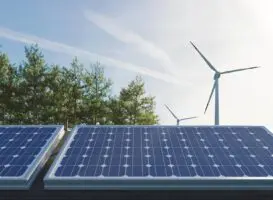The renewable energy industry in Australia might be tempted to pack their bags and find another country to conduct their business if the latest talk in Canberra is true: sources say that the Abbott government will name Alan Moran, an anti-renewable zealot from the Institute of Public Affairs, to a new panel that will review the Renewable Energy Target.
According to sources, Moran will be one of three or four business people appointed to an “independent” panel that will get secretarial support from the department of Prime Minister and Cabinet – rather than the department of Environment, or the department of Industry, which includes Energy.
If true, that will ensure that the panel is closely monitored by Prime Minister Tony Abbott’s inner core, who include the climate change contrarion and anti-wind advocate Maurice Newman – his chief business advisor – and others from the conservative hard right who neither accept the science of climate change, nor the attraction of renewable energy.
And if true, it will shape up as a disaster for the renewable energy industry in Australia, which has already ground to a halt because of policy uncertainty, and which could face not just the possibility of the RET being diluted, but removed altogether. The Abbott government is insisting on another review of the supposed health impacts of wind farms, despite not releasing a report from its main medical body, and there is also talk that the government support for rooftop solar will also be removed.
 Moran has famously hard-nosed views about renewables, and wind and solar in particular. In a panel discussion at Clean Energy Week in 2012, even former Senator Nick Minchin, the man who orchestrated Abbott’s rise to power and the scrapping of bipartisan climate policy, said Moran made him “look like a pinko”.
Moran has famously hard-nosed views about renewables, and wind and solar in particular. In a panel discussion at Clean Energy Week in 2012, even former Senator Nick Minchin, the man who orchestrated Abbott’s rise to power and the scrapping of bipartisan climate policy, said Moran made him “look like a pinko”.
Moran, like others from the IPA, including former head and now WA Energy Minister Mike Nahan, believe wind and solar don’t work, don’t cause abatement, and need like-for-like fossil fuel backup and constant spinning reserve, a myth that is repeated ad nauseum by conservative commentators.
When asked, at Clean Energy Week in 2012, of his vision of the future, Moran’ response was to look 50 years into the past. “We had communism then, we got the Greens now,” he grumbled. He said the energy profile in the 1960s was not much different from today, and “I expect that continue into the future.”
Moran’s appointment would be consistent with recent appointments made by the Abbott government. Another prominent IPA policy analyst, Tim Wilson, was appointed late last year to be a commissioner with the Human Rights Commission, a body he had argued should not exist.
Moran, who is the head of the IPA’s deregulation unit, last year was one of the main speakers at a poorly-attended anti-wind rally in Canberra, which described the RET as a fraud.
He described wind and solar as costly and “low quality”, said their costs were amplified by the need for back up in terms of fast-start conventional businesses, an were “imposing a huge burden on consumers and businesses.”
Abbott has been adopting many of these lines in his recent talking points. As has Newman.
Last week, Moran wrote an opinion piece in the AFR, which was titled “renewable energy sources are just a power failure.” You can find it on the IPA web-site.
He said the support of renewables entails “crippling subsidies paid by consumers and businesses.” He accused the RET of playing a role in the foreshadowed plant closures of Holden, Electrolux and the aluminium smelters at Kurri Kurri and Point Henry.
“Because of our readily available coal and gas Australian electricity costs are intrinsically among the lowest in the world. This was formerly crucial to attracting highly competitive energy-intensive industries like smelting. Australia could once again benefit from low-cost electricity if deregulation freed energy supply from its renewable obligations.”
RenewEconomy sought comment from the government, but was told only that the RET review details would be announced soon. The government was committed to lowering the cost of electricity, a spokesman said.
“The Government is committed to the RET and our policy has not changed,” the spokesman said in an emailed statement.
“Under the current legislation, a review of the RET is required this year. The Government will announce the Terms of Reference shortly.
“We understand the importance of providing certainty for those who’ve made investments in renewable energy and affirm our commitment to the RET.
“The Government is also committed to lowering the cost of living for Australian households, including the cost of electricity.
“The Government will not pre-empt the RET review. It will be undertaken in a thorough and consultative way giving the opportunity for the public to provide feedback.”
The details of the RET review had been due to be released before Christmas, but appear to have been derailed because it was unable to dissolve the Climate Change Authority, which conducted the last RET review, which found in favour of the renewables industry, and which has a statutory requirement to conduct the next review.
That may have made it difficult for the government to appoint the Productivity Commission, as some in Cabinet had urged. The creation of a panel is a potential way around that, even though the government is not obliged to adopt the CCA recommendations.
Many of Moran’s claims are wrong. South Australia now has more than 31 per cent of its demand sourced from wind and solar, without the need for any new back-up generation. The state’s wholesale cost of electricity, and its emissions profile, have fallen sharply.
There was one very revealing moment in Moran’s comments to the renewables industry in 2012. Moran had predicted that renewables such as wind and solar would account for just 1 per cent of global energy by 2050 – less than they do now. But in what must have been a Freudian slip, he acknowledged that there was a “slim chance” that a global accord to fight climate change could be implemented – in which case, he said, “there would be 60-70 per cent renewables.”







